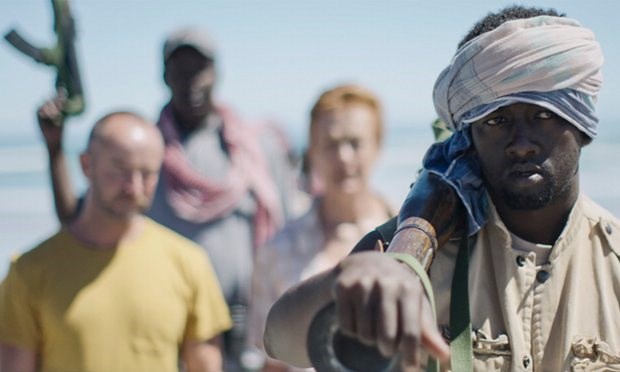
Thursday December 8, 2016

‘Our idea was to embrace the moral complexity of hostage negotiation’ … Captive. Photograph: Patrick Smith/Netflix
Never pay the ransom. It’s the the official line of governments across the world and yet, every year, millions of pounds change hands to secure the release of those taken in kidnappings.
The murky world of hostage negotiations is shrouded in mystery, done behind closed doors and often drags the most unsuspecting people into a web of organised crime or poverty-driven desperation.
But a new documentary series that lands on Netflix on 8 December will dive straight into these nefarious dealings, exposing how some of the most infamous kidnapping situations unfolded. Captive is the creation of Simon Chinn, the double Oscar-winning producer behind the documentary films Searching for Sugar Man and Man on Wire, whose interest in hostage situations was piqued a decade ago by the kidnapping of Channel 4 film-maker Sean Langan in Pakistan by the Taliban.
Langan was released after three months, but “the suggestion was that a transaction was made and a ransom was paid, even though the government’s policy was clearly that they didn’t negotiate with hostage takers”, says Chinn. “But somehow or other, it all got figured out.”
Chinn became intrigued by these negotiations, so often carried out by family members who have no past experience at all with the criminal world. After toying with writing a fictional drama on the subject, he swiftly realised it was an area where “fact was so much more compelling than fiction”.
Over the eight episodes of Captive, incidents such as US prison riots, kidnapping by Somali pirates, the captivity of British aid workers in Chechnya and the siege of Bethlehem are retold from all sides.
It has gained unprecedented access to not just those who were captured, but in some cases the people who actually did the kidnapping.
“Our idea was to tell the story from multiple perspectives and embrace the moral complexity of a hostage negotiation,” says Chinn. “Usually there are lots of competing agendas at play, but they are mired in politics or ideology or, frankly, material interest.”
“We were quite keen to strip our own morality out of this,” he added.
“There are obviously people you will have more sympathy with, usually those closest to the ‘victims’ – often the family members, who arguably have the purest agenda – but our position is that everyone else’s agenda is less pure and that’s what we wanted to explore.”
In many cases, the voices who contribute are those not usually found on television. In the Lucasville prison riot film, a former prisoner who was part of the white supremacist group Aryan Nations, and who took part in the 1993 violence that left 10 dead, is interviewed, as are prisoners on death row. Permission was denied to talk to those still in prison, so they had to film them surreptitiously through the glass, talking over a phone, during a prison visit.
The film about the kidnapping of the son of Coca-Cola heir Michael Bird in Brazil speaks to the man who carried out the capturing, while the episode on the siege of Bethlehem interviews everyone from members of al-Aqsa martyrs brigade to those in the Israeli Defence Forces in order to piece together how it happened.
“What always fascinated me was the humanity of a hostage situation,” says Chinn. “With the prison riots film, what’s fascinating is that even though it’s a prison, a place which is hell on earth and full of violent tribal groups, the prisoners and negotiator actually come together in pursuit of very reasonable, even laudable, demands – asking to be treated like human beings.”
Chinn sees Captive as part of a golden age of non-fiction TV that has recently emerged, with Netflix series such as Making a Murderer becoming global talking points. He says that while the stories told in the show are dark and grisly, they are also “hopeful and human”.
“Kidnap negotiations are one of the very few moments in any conflict situation where two warring parties have to sit down and empathise with each other,” he says. “Hostage negotiation can teach us a hell of a lot about how to find common ground, and meet your enemy in the middle.”
Captive is on Netflix from 9 December.